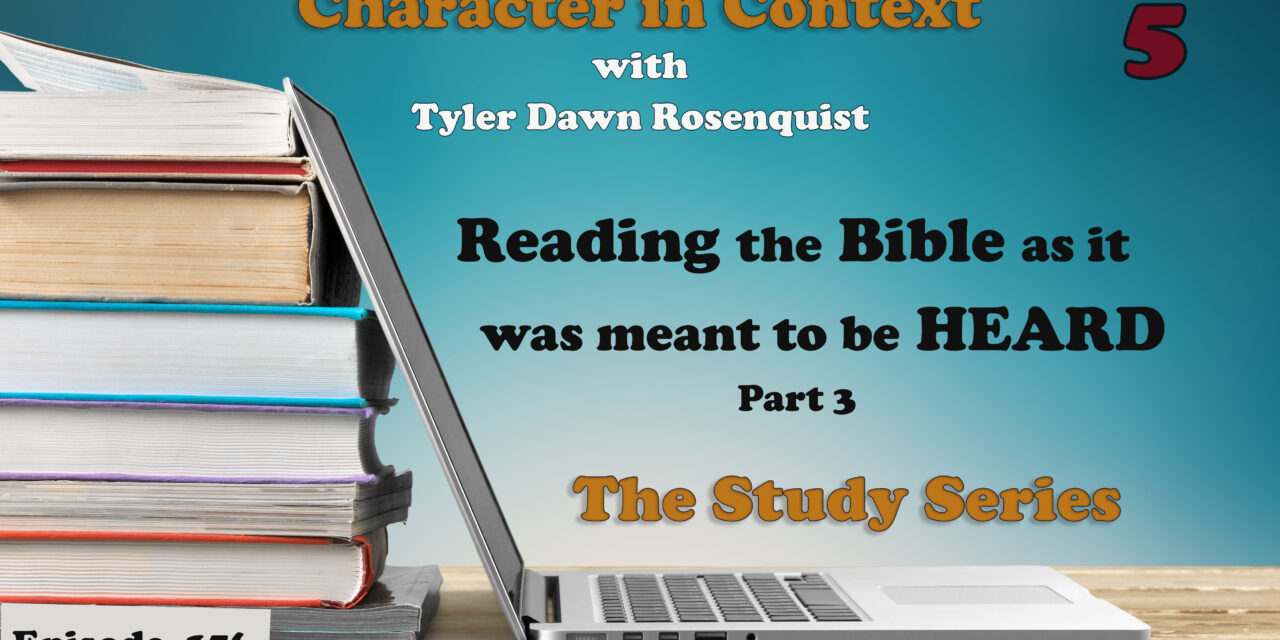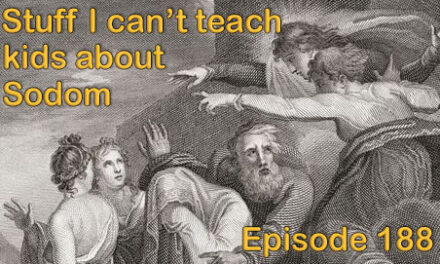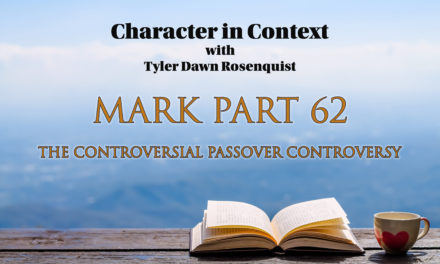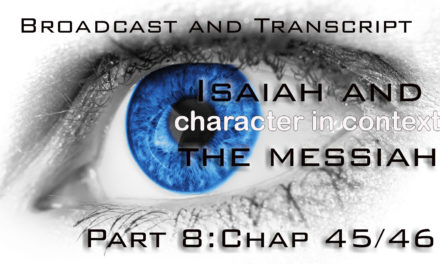How and why did the transmission of Scripture change in the first century and beyond? How did they get from the spoken words of John the Baptist and Yeshua/Jesus to the epistles of Paul and written Gospel accounts—and more importantly, why did they do it? What does it mean for us today in terms of God’s ongoing relational quest to communicate with His people?
If you can’t see the podcast player, click here.
Hi, I am Tyler Dawn Rosenquist and welcome to Character in Context, where I usually teach the historical and ancient sociological context of Scripture with an eye to developing the character of the Messiah. But not right now, right now I am doing a series about how to not waste your time with bad study practices, bad resources, and just the general confusion that I faced when I started studying the Bible and was trying to figure out what to do and whose books I should read. Bottom line, I read a lot of nonsense and spent a ton of money on it. I am going to give you some basics on how to avoid a lot of the pitfalls, save money, maximize your time and effort, and get the most out of what you are doing.
Master book list can be found here and I will add to it as needed.
In part one, I talked about the importance of Scriptural authority in ancient times and how authority was attributed not to words on paper but to the source of the spoken words themselves. For example, the authority of the Torah didn’t rest in words on paper but in having Moses as the source—it was Moses who was the authority. It wasn’t really until the time of Rashi that the letters and specific words themselves were considered important—even though we accept that as normative today and assume that’s how things always have been. But in an almost exclusively illiterate society where literacy was just a special skill set needed for certain rare jobs, it was the spoken word that carried the weight of authority and not the written. Writing things down was for contracts and royal archives and such, things that never touched the lives of ordinary people. With the things that were truly important, they were passed down through the generations orally so that they couldn’t be locked away somewhere inaccessible. Remember what Moses said in Deut 30:11-14 “This command that I give you today is certainly not too difficult or beyond your reach. It is not in heaven so that you have to ask, ‘Who will go up to heaven, get it for us (as if it is something that can be held), and proclaim it (that’s oral) to us so that we may follow it?’ And it is not across the sea (as if it was a thing) so that you have to ask, ‘Who will cross the sea, get it for us, and proclaim it (orally) to us so that we may follow it?’ But the message (dabar—speech, spoken word) is very near you, in your mouth (so that you can also speak it to your generations as per the Shema) and in your heart (what? Not on paper?), so that you may follow it.”
And I understand this can be jarring and sometimes people freak out and assume that I am saying that written Bibles and personal Bible study are bad but I never said anything of the sort. I am just saying that they are modern and that we make assumptions about them and how they received and transmitted the dabar of Yahweh based on what is normal for and important to us. Scripture was an oral community experience—and as such, it had what written Scripture doesn’t have much of—indications of tone and mood. In fact, once you have it pointed out to you, you just see it everywhere—like learning about Covenants and honor/shame language. But what about the First Century? How had things changed? A lot and not so much, actually.
Something that changed drastically after the time of Yeshua/Jesus was the need to communicate with other Christian communities over long distances but even with that, we do not see it happening for at least twenty years after the Resurrection. When Yeshua walked among us, He spoke, John the Baptist spoke and people went to hear Him. Yeshua traveled and spoke, probably delivering the exact or pretty close to the same message wherever He went and speaking parables in response to specific questions or local situations. His ministry was mostly self-contained in Galilee (first century map linked) and only rarely did He venture to the west, north and east, into Gentile territory, or south into Samaria and Judea for the festivals. But His ministry was really kept to a rather small geographical area—Galilee being not only very small but also rather mountainous as well. It would not have been impossible for Him to have preached to everyone in the region nor would it have been impossible for crowds to follow Him “everywhere”. I think here in the states, we might think of Galilee as being like one of our medium sized states but it absolutely isn’t. I am linking this really cool resource where you can take a map of all of modern day Israel and move it around on a US map to see how small the entire country is, and then remember that Galilee is only the northern part of the country.
So, John the Baptist spoke his message—he didn’t have scrolls out there in the wilderness to read from. Yeshua and His disciples traveled around the Galilee, speaking the message of the Kingdom and there is never any mention of scribes following Him around recording His words because it would have been completely unnecessary. His words were being stored in His disciples through repetition and rehearsal, and when they were sent out in two’s, they knew the message well enough to be entrusted with it. For example, and this is for folks my age and older. How many phone numbers did you have memorized when you were a kid and didn’t have them stored away in a cell phone and had to enter them in via a rotary or with buttons every single time? A lot, right? Can you do it now? No? Why not? Because we don’t have to anymore. When we had to and when it was beneficial, we were all like a regular walking Rolodex full of random numbers. In fact, it is hard for us to believe now how much they had memorized because we walk around with tiny little computers in our pockets and we just have no need any more to remember things. We can always do what we have to do and what we don’t have to do, we just don’t. They had to remember the stories, and the content of the message, and so they did. No scribes needed, they had their excellent memories—even if they didn’t always understand the point of what they were remembering!
After the resurrection, when all that they had learned began to make sense, they were still only preaching within eretz Israel for about the first ten years and not surprisingly focused their attention on Judea and Jerusalem, who had not been privy to the overwhelming majority of Yeshua’s teaching ministry. And they preached the message verbally and performed the miracles that Yeshua had performed in Galilee which accompanied the message. And that was entirely sufficient—no need for anything written down. Of course, they had the Torah scrolls now and had for hundreds of years, but the Gospel traveled by word of mouth and was attested to by signs and wonders. It wasn’t until the time of Paul that something new was needed. Paul traveled around, preaching the message of the Kingdom and planting congregations wherever he went. But it was over such a large area that things could get off track very quickly in his absence and so the solution to this problem came in the form of epistles—letters carried by messengers. But here is what many fail to understand about these letters: they were performance art.
Paul would speak a message intended for a certain congregation, often in response to specific messages he himself had received from them concerning regional difficulties and interpersonal problems. Sometimes these problems are universal (infighting) and others more time-bound in nature (those dealing with imperial cult controversies within the Roman Empire) and others were specifically limited to a city or region (the problems in Ephesus related to women being entirely uneducated and trying to fit in, for the first time, with congregational life) or cultural concerns (long-haired men and married women going without their head-coverings in the Roman colony at Corinth). Paul couldn’t travel every time there was a question but he could send a message on parchment, carried by a messenger who had heard him speak it and understood the context and his tone, and spoken aloud to the specific congregation. For example, we actually see this in Romans. Now, these cases shouldn’t be confused with personal letters, like the letter to Timothy which wouldn’t need to be performed. But in the letter to the congregation in Rome, in chapter 16, Paul says: “I commend to you our sister Phoebe, who is a servant of the church in Cenchreae. So you should welcome her in the Lord in a manner worthy of the saints and assist her in whatever matter she may require your help. For indeed she has been a benefactor of many—and of me also.” Now, why is this even important? What is Paul saying here? Everyone else gets a greeting, but Phoebe gets a recommendation. Paul is telling the congregation in Rome to receive Phoebe, to welcome her, to extend hospitality. Phoebe almost certainly carried the letter from Corinth, where Paul was, which is about five miles west of the port of Cenchreae, to the Roman congregation. This was a very important job, being entrusted with personal correspondence between Paul and the Roman believers. She also would have been the person who read it aloud to them as she was a witness not only to what was said but how it was said. She would be the one to whom questions about what Paul meant would have been addressed. Being a messenger in that world was a lot more than just delivering the mail. She would have been responsible for getting the message there but also delivering the content of it accurately in words and tone. In effect, as Craig Keener has pointed out, she was almost certainly the first teacher of the epistle of Romans. Let’s be honest—Romans would undoubtedly be easier to understand if we were reading it as it was intended to be heard and understood.
All letters to congregations would be handled in this manner and perhaps even some personal correspondence as well. In a language devoid of spaces between words and punctuation, the messenger had to not only be trustworthy but also very intelligent and able to field questions. It was also likely that this is the same reason why the Gospel accounts began to be written down around the same time. New stories are notoriously more difficult to spread accurately than old stories that have been practiced generationally to the point where the listeners could spot errors. The more people heard an initial story, the more accountability, but Paul had never heard anything firsthand and neither had the Jews or Gentiles he preached to in the Diaspora. They were being saved and coming to faith and allegiance to Yahweh through Yeshua, which is the important thing, but with hundreds or thousands of miles for the story to travel it is easy to see how nonsense could get injected into the stories or local superstition added in. And so probably Mark was written first, and John last. The writing styles are entirely different, reflecting very different storytellers who were giving the same account in different ways depending on which facet of the story they wanted to tell. For Matthew, writing to a sectarian Jewish/Christian audience, Yeshua was the second and greater Moses. Mark presents us with Yeshua as the Yahweh Warrior/Arm of the Lord of Isaiah, personally leading the second Exodus. Luke gives us Yeshua the storyteller, and John presents his High Christology of Yeshua the spoken, creative Word of Yahweh who is one with the Father. And they are very different, and obviously come not only from different viewpoints but also draw from different oral sources. Some is exactly the same, but as the Gospel traveled, we would expect to see different apostles/teachers/etc emphasizing different aspects of His message and ministry. The Gospel is alive—not on rails so that all four accounts should tell the exact same story in the exact same way. That’s how oral culture works—even when it begins to be written down so that it can travel far, far away from Jerusalem.
In fact, I don’t know if I mentioned this before but religion was very much one of the main reasons that anything was ever written down in the first place. Rituals, omens, prophecies, temple records, banking records (ancient temples functioned as banks), etc. And of course, we have already talked about the importance of archives and royal correspondence. The Gospel, of course, should absolutely be considered royal correspondence and so it was vital that it be delivered orally and face to face to the people. As the authority of the Torah was that it was spoken by the mouth of Moses and not that it was written down, so the authority of the Gospel came from it being spoken by Yeshua, and not only that—John tells us that Yeshua is the logos, the spoken word, of Yahweh because that was where authority came from—His spoken words. “Let there be light!”—words of authority. He didn’t write these things down and boom, they happened. He spoke. Yahweh spoke to Adam and Eve and the Serpent, and then to Cain and to Noah. Yahweh spoke to Abraham, and then appeared and spoke to Abraham. He sent angelic messengers to speak to Lot and to Hagar and to Joshua. He spoke to Moses “mouth to mouth” as friends do, is what it says in Num 12:8. He speaks in dreams and visions. He spoke to Pharaoh through Moses and Aaron, and to the children of Israel and the mixed multitude through Moses. And to the people through the prophets. Yahweh speaks and speaks and speaks. And so the Bible is a book that is meant to be heard and experienced not as written correspondence so much as relationally conversational. The Bible is largely a huge conversation between Yahweh and His creation.
And it is huge and game-changing because whereas the Greeks often believed that the gods were distant and uninterested, it requires a lot of interest and stooping to our level to communicate with us in ways that we can understand and Yahweh must restrict Himself in many ways in order to do it. Communication is inherently a concession where the person reaching out with words has to do everything in their power to be understood. It is why the explanation I would give to you about absolutely anything wouldn’t be the same way I would explain it to a small child. I have to meet them with the simple concepts they have already mastered so that I can use what they already understand (which may or may not be entirely accurate) to explain to them what they don’t understand yet. Telling kids what I know and expecting them to catch on would make me a jerk and not a teacher. And actually, that brings to mind the day that Yahweh made me a teacher. I was sitting in a mall with a friend who had visitation with his kid and he asked me to explain something to him out of the Bible and I cringed because I couldn’t teach a pig how to roll in the mud—seriously. But I got a piece of paper and the explanations began to spill out of my mouth in a way that made perfect sense and he got up and danced. Seriously, he danced. He’s an emotional guy.
So, the next time you look at Scripture and are confronted with a factoid that is incorrect, I don’t want you to sweat it. I want you to think about the fact that the cost of teaching truth often comes in the area of accuracy. If your kids have asked where babies come from yet, you know that it is possible to be honest without being accurate, or to relay concepts without being graphically honest. God does this with us from the first to last page of Scripture because we are not where He is at in any way, shape or form. He can’t express to us what He knows because we are too stupid and limited to even begin to grasp it and if we tried our brains would likely explode from the input. Like those silly old movies where you feed too much data into a computer and it starts shaking and blowing out black smoke and sparks and then just dies.
Oral transmission of what later became written Scripture was a concession to the culture and the contents were a concession to what they were capable of understanding. Written transmission of God’s spoken words was also a concession to the culture and growing needs of the culture and the contents were a concession to the limitations of written language given the lack of ability to express tone and mood through text. Going on from there, translations of the texts—on top of all those other concessions—had to make sacrifices in content for any number of reasons. Just because Hebrew has a word like shema, doesn’t mean that other languages have any word that means hear and obey at the exact same time. And just because Hebrew had the “sh” sound and the “y” sound, doesn’t mean that Greek did. Just because Hebrew allows a masculine name to end with the “ah” sound, doesn’t mean that you can do it in Greek or Latin. Communication is always about compromise, and there is no communication when someone isn’t willing to meet their audience exactly where they are. Love always does what it takes to communicate.
Paul alluded to this reality when He told the people of Corinth, “Although I am free from all and not anyone’s slave, I have made myself a slave to everyone, in order to win more people. To the Jews I became like a Jew, to win Jews; to those under the law, like one under the law—though I myself am not under the law—to win those under the law. To those who are without the law, like one without the law—though I am not without God’s law but under the law of Christ—to win those without the law. To the weak I became weak, in order to win the weak. I have become all things to all people, so that I may by every possible means save some. Now I do all this because of the gospel, so that I may share in the blessings.” (I Cor 9:19-23, CSB). Why did Yahweh visit His people through Yeshua in the flesh? Communication of His message on our level so we could hear and experience. To Jews so He came as a Jew. To a patriarchal culture He came as a man. To a nation looking for a Messiah He came from the line of David the King. To the Torah observant He came as Torah observant, just not according to their exact standards on everything but enough that they heard Him. To an oral culture He delivered an oral message.
When you have dreams or when God shows you something, does He use the visual imagery of the time of Moses, or Yeshua? Or does He show you things from your own experiences? This is why I hate dream books because dream interpretation is very cultural and subjective. We see rabbits and we think of fertility and they would see them as cleverness in the midst of chaos. We see a cow and we think of steak but they would see a cow and think of wealth and fertility. Yahweh is not a god of confusion—He comes to us, whispers to us in our own language, relates to us according to our cultural understandings—and He will still be doing just that in another thousand years if Yeshua tarries. And how He talks to them will be very different than He talks to us. Lust is and still will be lust and greed and murder and adultery—some things never change—but He is more likely to speak to many through the written word because that is what kind of culture we are and what we respond to best. Remember that when you read the Bible—this is communication not at God’s level but always at the level of the original audience. It is for us but not to us.
Next week, we will go back to the beginning to talk about the importance of genre—and not reading every line of the Bible as though it is meant to be the same as everything else.






















You make me feel like dancing❣️